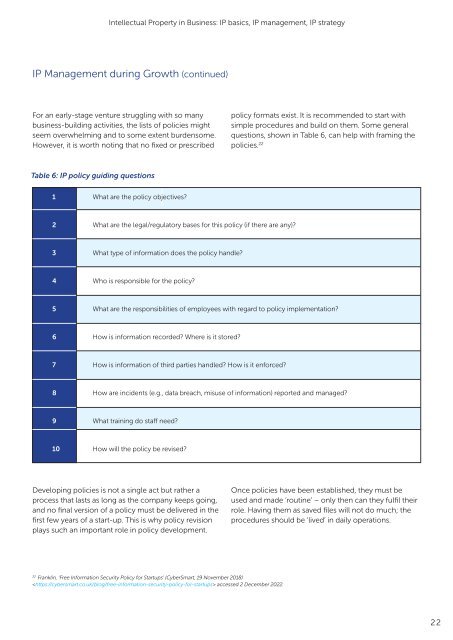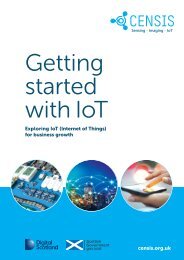CENSIS white paper: Intellectual Property in Business
2023: This CENSIS white paper sets out to make the topic of IP more approachable, less intimidating and more manageable, offering experience-based advice and methods are are designed to help businesses structure their IP- related issues and makes the best of their IP. Covering: The role of IP, IP management during growth, IP strategy for expanding companies and corporates, Business IP Canvas - merging IP with your business model.
2023: This CENSIS white paper sets out to make the topic of IP more approachable, less intimidating and more manageable, offering experience-based advice and methods are are designed to help businesses structure their IP- related issues and makes the best of their IP.
Covering:
The role of IP, IP management during growth, IP strategy for expanding companies and corporates, Business IP Canvas - merging IP with your business model.
You also want an ePaper? Increase the reach of your titles
YUMPU automatically turns print PDFs into web optimized ePapers that Google loves.
<strong>Intellectual</strong> <strong>Property</strong> <strong>in</strong> Bus<strong>in</strong>ess: IP basics, IP management, IP strategy<br />
IP Management dur<strong>in</strong>g Growth (cont<strong>in</strong>ued)<br />
For an early-stage venture struggl<strong>in</strong>g with so many<br />
bus<strong>in</strong>ess-build<strong>in</strong>g activities, the lists of policies might<br />
seem overwhelm<strong>in</strong>g and to some extent burdensome.<br />
However, it is worth not<strong>in</strong>g that no fixed or prescribed<br />
policy formats exist. It is recommended to start with<br />
simple procedures and build on them. Some general<br />
questions, shown <strong>in</strong> Table 6, can help with fram<strong>in</strong>g the<br />
policies. 22<br />
Table 6: IP policy guid<strong>in</strong>g questions<br />
1 What are the policy objectives?<br />
2 What are the legal/regulatory bases for this policy (if there are any)?<br />
3 What type of <strong>in</strong>formation does the policy handle?<br />
4 Who is responsible for the policy?<br />
5 What are the responsibilities of employees with regard to policy implementation?<br />
6 How is <strong>in</strong>formation recorded? Where is it stored?<br />
7 How is <strong>in</strong>formation of third parties handled? How is it enforced?<br />
8 How are <strong>in</strong>cidents (e.g., data breach, misuse of <strong>in</strong>formation) reported and managed?<br />
9 What tra<strong>in</strong><strong>in</strong>g do staff need?<br />
10 How will the policy be revised?<br />
Develop<strong>in</strong>g policies is not a s<strong>in</strong>gle act but rather a<br />
process that lasts as long as the company keeps go<strong>in</strong>g,<br />
and no f<strong>in</strong>al version of a policy must be delivered <strong>in</strong> the<br />
first few years of a start-up. This is why policy revision<br />
plays such an important role <strong>in</strong> policy development.<br />
Once policies have been established, they must be<br />
used and made ‘rout<strong>in</strong>e’ – only then can they fulfil their<br />
role. Hav<strong>in</strong>g them as saved files will not do much; the<br />
procedures should be ‘lived’ <strong>in</strong> daily operations.<br />
22<br />
Frankl<strong>in</strong>, ‘Free Information Security Policy for Startups’ (CyberSmart, 19 November 2018)<br />
accessed 2 December 2022.<br />
22

















